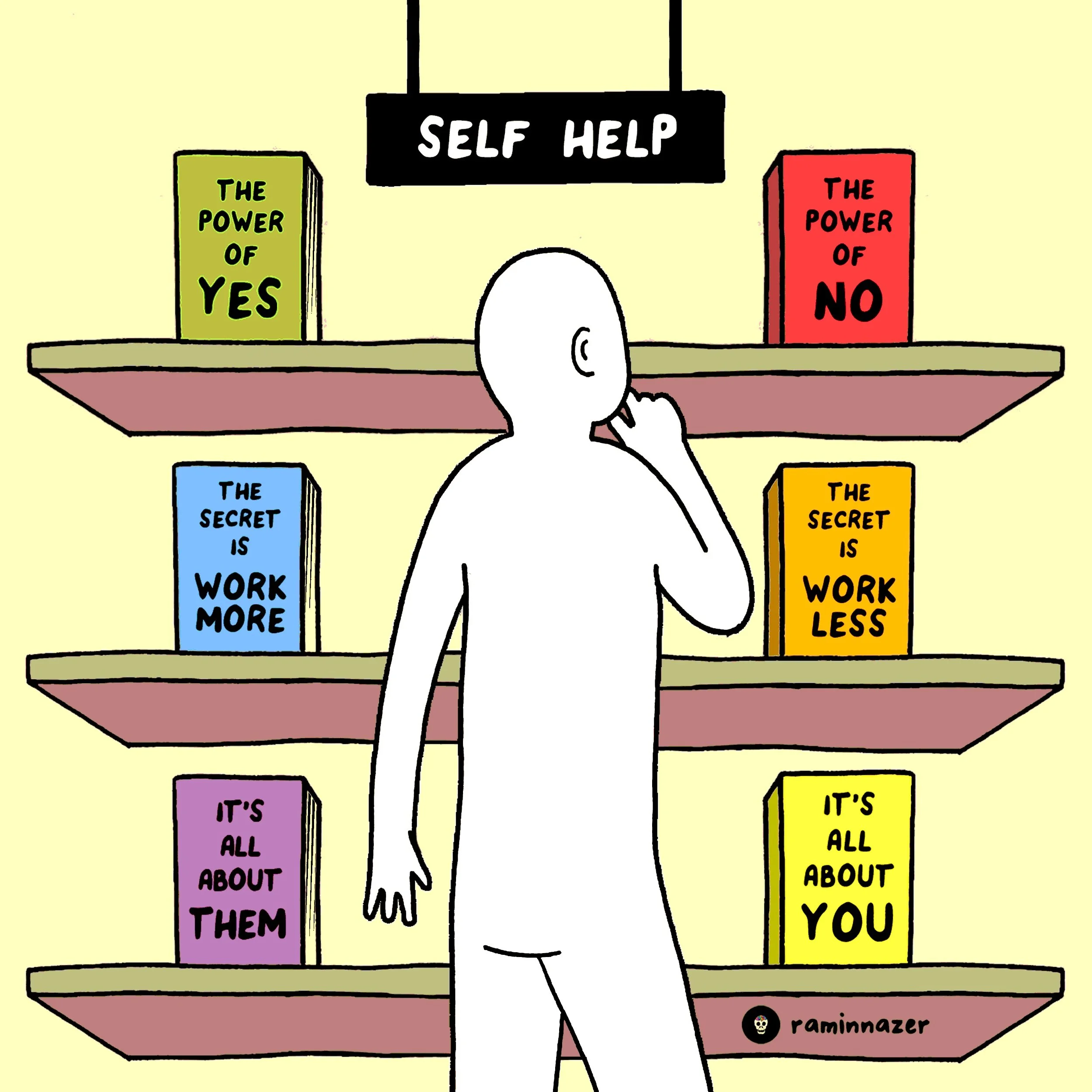Guided therapy vs self help?
Going therapy alone vs getting a therapist?
My constant curiosity has driven me to switch places with my clients prior to making first steps to getting help. Without much knowledge, some misconceptions and high distress one must choose between self-help or professionally guided therapy. Firstly, I would like to explain these concepts.
Self-help is a self-guided effort to achieve & overcome ones internal crises. This might involve researching the plethora of online readings, reading expensive thick books, following online manuals or maybe even just completing tasks instructed by our favourite influencer. However the key word here is - doing this mostly alone!
Conversely, professionally guided therapy involves following guidance by a fully trained and qualified Registered Psychologist who’s main invested interest is to help the client in an unbiased way.
Below i have sought to discover 10 reasons of consideration prior to starting the journey of recovery.
Self-help can be biased. Think of the concept ‘echo chamber’- we tend to continuously only seek out what we like and subconsciously reinforce our own preconceived ideas/beliefs. But of course, we sometimes we choose to ignore what’s bad for us or maybe more importantly ignore its validity.
Self-help implies a lack of social support. The pandemic taught us that humans are socially dependent. Autonomy/accountability and motivation, paradoxically, all come about when faced with shame or despair. Note, it’s coming to accept these unpleasant emotions which help drive us to getting the help we really need. This is evolution.
Self-help ignores our blind spots. Sigmund Freud (a pioneer of western psychology) used the ‘ice berg’ metaphor to explain the limitations of how we process information or rather, see ourselves. He suggests that what we see with our conscious mind (the small tip of the iceberg) is only a small part relative to our unconscious mind (the large hidden part of the ice berg).
Self-help, the cheaper & easiest option. Often it may be the perceived and most economic option at the time, however may be more and costly and time consuming in the long term. Evidence suggests that early intervention far outweighs a delayed and prolonged solution focus. Furthermore, evidence suggests that more commonly mental health presents comorbidly. For example, untreated anxiety often leads to not only worse anxiety but also feelings of low mood, insomnia and depression.
Self-help is focused on mainly a positive psychology framework. Adopting positive attitudes can be hard to turn on, especially when we some of us have traits that incorporate pessimistic and realistic outlooks. It can be hard to see the glass half full when others choose to see it as half empty in order to motivate oneself.
Professionally guided therapy involves a supportive, neutral, structured and tailored approach. This facilitates personal growth in the context of another, which in turn helps the individual feel pride and contentment that they are making progress, without second doubting themselves.
Professionally guided therapy can be akin to seeing an expert for one’s mind. Do we always seek a doctor when we break a bone? Getting a professional opinion with the most effective and up to date treatment often costs but comes with improved life satisfaction.
Professionally guided therapy does take time and sometimes can feel inconvenient to ones busy schedule. However, rewards that come about over long durations and are intrinsic have sustained effects. For example, life satisfaction or happiness reached from personal growth versus the feelings of accumulating material wealth.
Professionally guided therapy entails social learning, a concept which suggests that individuals model others around them. That is, even the therapist. Attitudes can be contagious.
Professional guided therapy relies on rapport and the therapist, themself, which is the most important ingredient in the alliance. Current research states the Therapist is 6-9 times more potent than the technique they use. We can be caught in the illusion of resilience or omnipotence, however paradoxically self-help can be ego satisfying for example, through self-discovery. However, as Hellen Keller simply puts it, “Alone we can do so little; together we can do so much.” While being alone can be beneficial for personal growth and reflection, working together with others can lead to great accomplishments and change.



